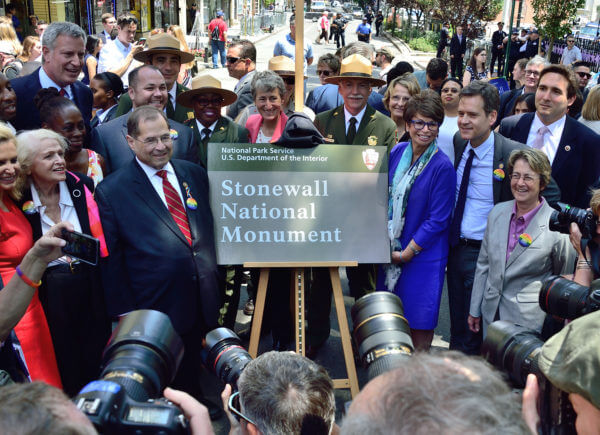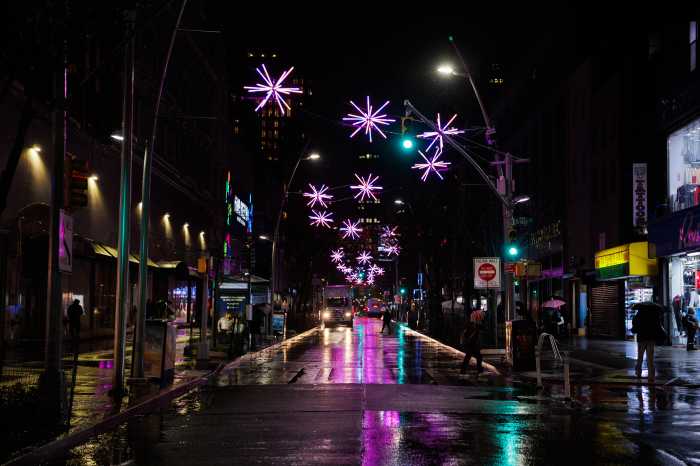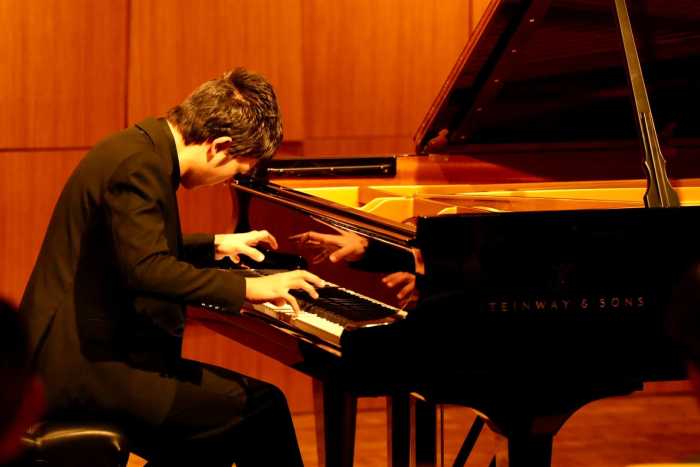Tiernan Brady address the crowd at the Irish Consulate in Manhattan on May 11. | ANDY HUMM
BY ANDY HUMM | Irish gay activist Tiernan Brady has the distinction of leading the first two successful national referenda on marriage equality, helming Yes Equality in Ireland in 2015 and the Equality Campaign in Australia last year. He may be needed in Taiwan soon for yet another popular vote on same-sex marriage, but he paused to share his insights at a forum in New York this month at the Irish Consulate.
Consul General Ciarán Madden, in introducing Brady to a packed house on May 11, said, “The Ireland of today is vastly different to the Ireland where I grew up. It’s the 25th anniversary of the decriminalization of homosexuality in Ireland. People can be who they actually are” — and that would include the taoiseach or prime minister of Ireland, Leo Varadkar, who came out several years before his election to the top spot.
Brady, who got his start in in politics in 1999 as a councilmember in small-town Bundoran and went on to direct the Gay and Lesbian Equality Network in 2011 that won civil partnerships, opened his remarks by saying, “Where we grew up, if you are of a certain age — which I am — you didn’t grow up hating yourself [for being gay] because there wasn’t anything. There was an absence of a reference point. And the worst thing you can do is make someone invisible.”
Tiernan Brady tells packed crowd campaigns put faces on the issue
“Reversing that invisibility,” he continued, was key to winning the Irish marriage equality campaign. “It wasn’t one person. It was hundreds of thousands.”
The campaign’s message, Brady said, was that “you are the most important person [to the campaign] in your space. We had to get marriage equality to stop being a ‘what’ and start being a ‘who.’”
He added, “When we hear a message from someone who shares our values, we listen more.” It was important to “allow people to see how powerful they are.” This led to campaigners calling their parents and grandparents for their votes — and sometimes posting moving videos of their encounters online.
“Ireland shook the world” with its affirmation of gay marriage by 62 percent of voters, Brady said, and that fed into the strategy he took to Australia two years later. While the Irish needed a popular vote to change their constitution to open marriage to same-sex couples, the Australia vote was a postal advisory vote cooked up by the Conservative government to give itself cover for a vote in Parliament. The vote there was also 62 percent for marriage equality and Parliament then voted overwhelmingly to change the law to allow gay and lesbian couples to marry.
The polls in Australia had initially shown 65 percent support, but Brady said that the “no” side worked hard to create doubt in voters by raising issues about how it would affect sex education in schools and whether it would mandate gender-neutral bathrooms. The “yes” campaign’s response was, “Don’t run down the rabbit hole” answering their attacks. “Build a level of trust with our supporters instead” of trying to convince “the 10 percent who will never agree with us. Stay on message,” Brady urged, his bottom line advice to his campaigners being, “If we don’t [give] respect, we don’t get it.”
“We’re all stuck on this island,” Brady emphasized in the campaigns. “And the losers don’t have to leave. We have to campaign knowing we are going to share spaces. The tone you set is the tone the most vulnerable LGBT people” in the country have to live with. “Winning isn’t about defeating someone, but about winning them over.”
Tiernan Brady, Irish Voice arts editor Cahir O’Doherty, and City Councilmember Daniel Dromm. | ANDY HUMM
He reminded the mixed but mostly LGBTQ crowd in Manhattan that “people are terrified to talk to gay people about gay stuff,” worried about using the wrong terminology. “We expect them to have a PhD in ‘Gay.’”
Brady added, “We have to tear down our walls, too. We don’t need people to be experts. We just need them to support our equality.”
Out gay City Councilmember Daniel Dromm, who hosted Brady at the Council’s LGBT Caucus earlier in the week, recalled speaking to a 19-year-old at an LGBTQ event in Queens recently.
“I asked if he was out to his parents,” Dromm said. “And he said, ‘I will never be able to tell my mother.’”
Dromm, whose own mother Audrey Gallagher — who died early this year — was a founder of PFLAG in Queens, said, “We still have youth that think like that. Think of the work that we still have to do.”
Ann Northrop, introducing him on the Gay USA show she and I co-host, called Brady “a big hero.” He said that the conservative values of Ireland — “respect, human dignity, treating your neighbor as you would treat yourself” — “were really good reasons to support equality.”
“Social change is a journey,” Brady said. “Most people on our side were on the other side 10 years ago. The real change isn’t just marriage, it’s social harmony.”



















